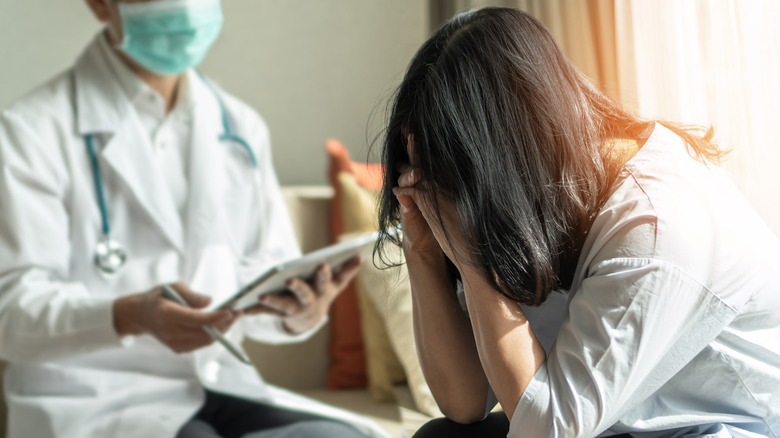Women Are Still Being Dismissed By Doctors — And The Burden Of Change Shouldn't Fall On Us
There's a serious gender bias in health care, where women are routinely dismissed by their doctors. This dismissal can occur at all stages of medical care, from routine check-ups to specific health concerns, and it impacts the kinds of care and treatments that women receive or, more to the point, don't receive. Women are brushed off by physicians, being told our concerns are all in our heads. Women are also often under-treated because the severity of female pain is routinely underestimated. Concrete — and alarming symptoms — go ignored.
This phenomenon of physician dismissal is rampant and brings with it detrimental consequences. Several women came forward and shared their own stories with Today, revealing a harrowing pattern of medical flippancy in the face of female health. A pregnant patient named Stephanie said that her doctor brushed off her concerns, claiming that she was overly anxious, only to find out that she had preeclampsia. Her child was born prematurely. Another patient, Charity, shared that she went to the emergency room with severe back pain and was told she had sciatica. She was persistent and an X-ray later revealed that she had a tumor on her spine. Michelle showed her doctor a brown spot on her face, only to be told that it was nothing more than a cosmetic concern. It turns out it was desmoplastic melanoma. Women are sent to therapists when they have physical ailments after misdiagnoses of anxiety. There's a glaring need for change and it shouldn't just fall on women to fix this.
How women get gaslit by medicine
A study conducted by the Kaiser Family Foundation (KFF) in 2022 revealed that 29% of women have reported being dismissed by their doctor. This dismissal manifests in many different ways. The Academic Emergency Medicine Journal discovered that women, on average, wait longer for pain intervention than men do when they arrive at the ER with severe stomach pain. Several physicians have theorized why this might be the case; the primary reason is both conscious and unconscious gender bias.
But part of the problem also has to do with the historical silencing of women and the expectation that women be cooperative and docile. "I believe that psychological and social influences contribute to women being gaslighted," Dr. Bella Grossman told Northwell Health. "For example, men have a tendency to be more vocal and more persistent with their concerns. Women may have a harder time pushing back and advocating for themselves. They feel like they need to be good patients, which means accepting what their doctors tell them. But by doing so, they're stripping themselves of a voice."
Clearly, we need to get to a solution, but what's to be done? The onus, Dr. Grossman pointed out, shouldn't fall on women. Certainly, women can be encouraged to be more vocal and persistent, but Grossman said a comprehensive medical approach is most successful with women. "We have integrated programs that take all aspects of a woman into account — her medical history, symptoms, nutrition, and other lifestyle factors," Grossman said. "When women are treated by integrated teams, they are much less likely to have their complaints treated as solely 'emotional.'"
It's all in your head
In another vein of gender bias in medicine, KFF's health survey found that 15% of women reported that their doctors didn't believe them when they reported medical issues and symptoms. Physicians consistently brush women off with the assumption that physical ailments are simply a manifestation of mental health issues, thus missing a proper diagnosis. This can lead to untreated illness, neglect, and in some cases, death. Dr. Alyson McGregor told Today, "Women are stigmatized as being anxious." This means that doctors can be quicker to brush off symptoms as psychosomatic than they would be with a male patient.
Dr. Stephanie Trentacoste McNally told Northwell Health that women still get neglected in the health world based on the excuse that their issues are hormonal or emotional. "It's no accident that the word 'hysteria' originates from the Greek word for 'uterus,'" Dr. McNally said. "There's still this pervasive belief in the medical community that anytime a woman complains about her health, it's either related to her hormones or all in her head." Dr. McNally explained that the troubling medical history around female hysteria isn't as far in the past as we would wish it to be. Women's health issues often don't get treated with the same gravity as their male counterparts because of the gender bias around emotions, hormones, and anxiety.
Medical neglect around women in pain
Women's pain is consistently underestimated in the medical community. The gender bias towards women in medicine gets it wrong on both sides of the pain scale. There's either the incorrect assumption that women are overly sensitive toward pain, or there's the assumption that women have a high threshold for pain. In both cases, women are not offered the relief, attention, and symptom management that they need.
The situation can be even worse for women who experience chronic pain. To make matters even more infuriating, women are left out of 80% of pain studies, according to Harvard Health Publishing, leaving a gap in research for more information about women. As Science Daily reports, when women voice complaints about pain, they're more frequently given recommendations for psychotherapy, while men are given pain relief.
What's the proper course of action here? Dr. Jennifer Hermina Mieres told Northwell Health that many doctors are still operating from an antiquated form of medicine whose research revolved around these male-based studies. "We still have many mid-career and senior physicians whose practice of medicine is based on the 'one-size-fits-all' approach to diagnosis and treatment," Dr. Mieres said. "A sex- and gender-based approach to disease management is not even on their radar." Dr. Mieres also stressed that women need to be assertive when treatment doesn't feel effective for them. And the medical community has to respond to that so that women can receive efficient diagnoses, effective pain management, and the attention and care they need and deserve.



